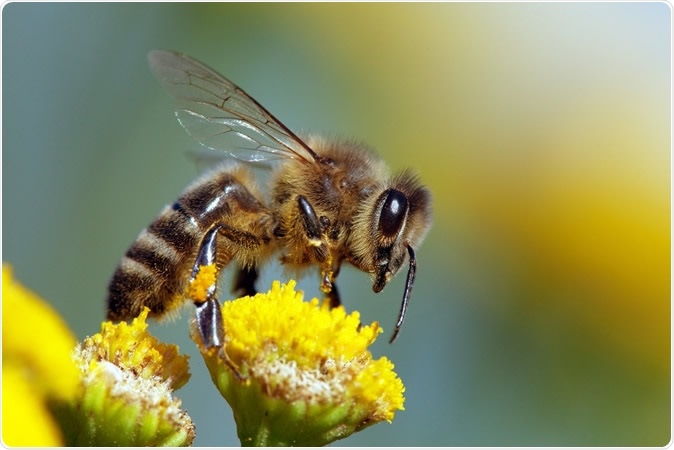A recently completed trial on a bee sting vaccine containing a novel adjuvant called Advax to increase its efficacy has raised hopes that severe allergic reactions, sometimes fatal, to bee venom in allergic people could soon be a thing of the past. The vaccine was designed to neutralize the venom of the European honeybee. The research titled, 'Randomized controlled trial demonstrating the benefits of delta inulin adjuvanted immunotherapy in patients with bee venom allergy', is published in the The Journal of Allergy and Clinical Immunology.
In most cases, a bee sting is quite painful but the trouble ends there. With respect to a few individuals, however, the venom causes an overwhelming allergic reaction called anaphylaxis to occur which can even snuff out life if not treated in time. This reaction can be prevented in the vast majority of cases by immunotherapy, a procedure in which the agent causing allergy is injected into the body in minute doses, building up over time. This process stimulates the production of blocking antibodies against the venom in the body of the allergic individual. These bind to the venom as soon as it enters the body, preventing it from evoking anaphylaxis.

Honeybee - Image Credit: Daniel Prudek / Shutterstock
Why adjuvants are used
For successful immunotherapy, the antigen used must be capable of eliciting an adequate but not harmful immune reaction in the body. If the antigen is too weak, the time required to build up an immune reaction to the point where it is protective could be unduly long, making the process time-consuming, increasing the number of doses of venom, which is costly, and reducing the acceptability to potential users. Moreover, patients on immunotherapy may still suffer anaphylactic reactions while on immunotherapy until clinically useful levels of the antibodies are achieved in the body. This could defer the utility of the treatment for a prolonged period.
To circumvent this, substances called adjuvants are commonly used in vaccines against infectious agents. These make them much more immunogenic, or capable of raising an effective immune response against the associated antigen.
The Australian researchers who conducted the current trial used bee sting venom associated with a unique adjuvant compound called Advax, based on a complex sugar called delta inulin. Advax does not cause inflammation independently. The aim of the trial was to see how safe and effective honeybee venom immunotherapy (HBVIT) was when the venom was combined with Advax.
The Advax adjuvant was developed by Vaxine Pty Ltd in Adelaide, Australia, and has been a part of vaccines against hepatitis, flu (both seasonal and pandemic strains), malaria, Alzheimer’s disease, and cancer, among others. This study brings the number of individuals who have received this adjuvant in various vaccines to over one thousand.
What was done?
The current randomized controlled trial was performed on 27 adults who had a history of developing rapid systemic allergies in response to bee stings. The patients were randomly assigned to receive the vaccine with or without Advax adjuvant. After maintenance doses were attained, the vaccine was continued once a month for all patients for 30 more months.
All patients reported a good safety profile, with no severe adverse reactions. By the 14th week, both groups showed peak levels of IgG antibodies. Blood tests showed that all 27 patients developed blocking IgG antibodies, though in different patterns, early in the course of HBVIT, and this response was sustained.
However, the use of Advax significantly boosted the immune reaction to the vaccine, with the peak levels being attained earlier and reaching higher levels, and remaining high for longer periods. This would make it much easier to achieve and maintain useful levels of antibody against the bee venom, to neutralize the venom.
What do the results mean?
Researcher Professor Nikolai Petrovsky comments, “Our technology is like adding a turbocharger to a car and in this case makes the bee allergy vaccine much more powerful, allowing the immune system to better neutralise the bee venom and prevent allergic symptoms.”
Another colleage, Anthony Smith, explains that the currently available formulation for immunotherapy against bee sting venom is so weak that people need to take 50 injectable doses over a long period of 3 years to achieve a useful level of immunity. The Advax adjuvant tested in this trial will reduce that considerably while maintaining a high level of immune antibodies against the venom. He says, “The current treatment option for serious bee venom allergies is lengthy and cumbersome, so I hope this enhanced bee venom therapy brings about faster, but longer lasting protection to bee stings for allergic individuals.”
The study was carried out at Flinders University and the Royal Adelaide Hospital.
Journal reference:
Randomized controlled trial demonstrating the benefits of delta inulin adjuvanted immunotherapy in patients with bee venom allergy, Heddle, Robert et al., Journal of Allergy and Clinical Immunology, DOI: https://doi.org/10.1016/j.jaci.2019.03.035, https://www.jacionline.org/article/S0091-6749(19)30620-7/fulltext